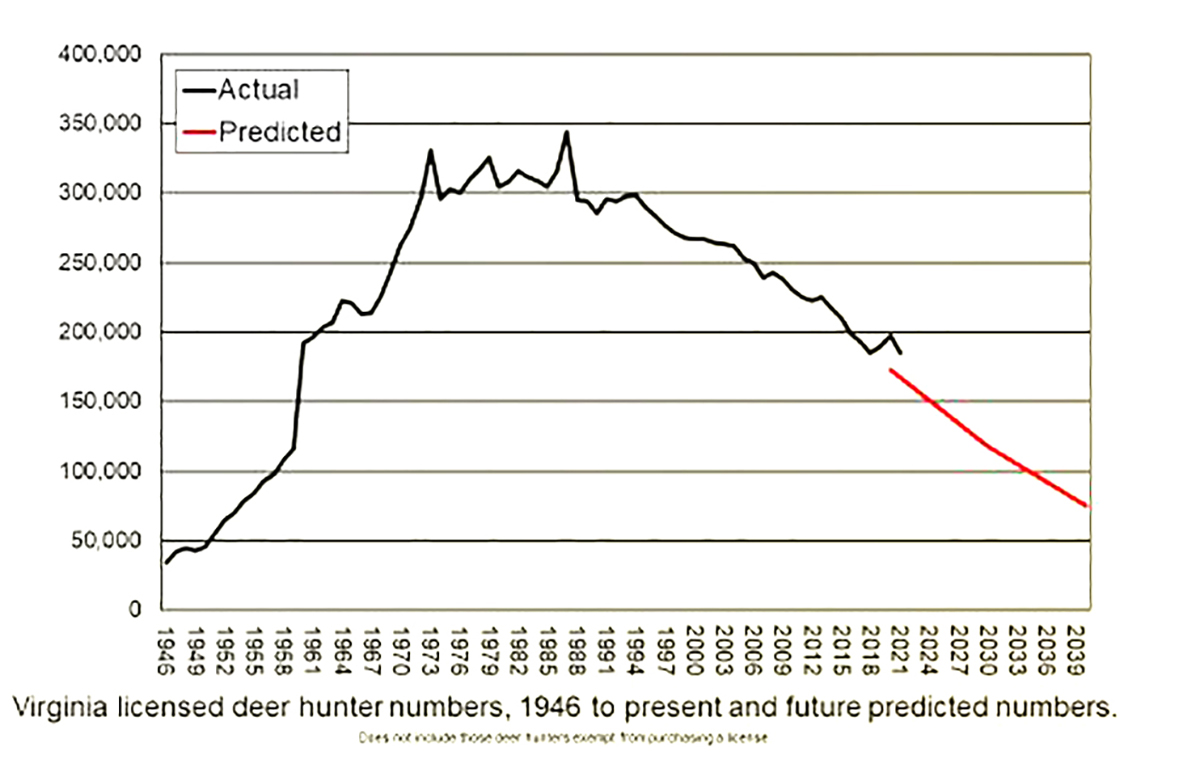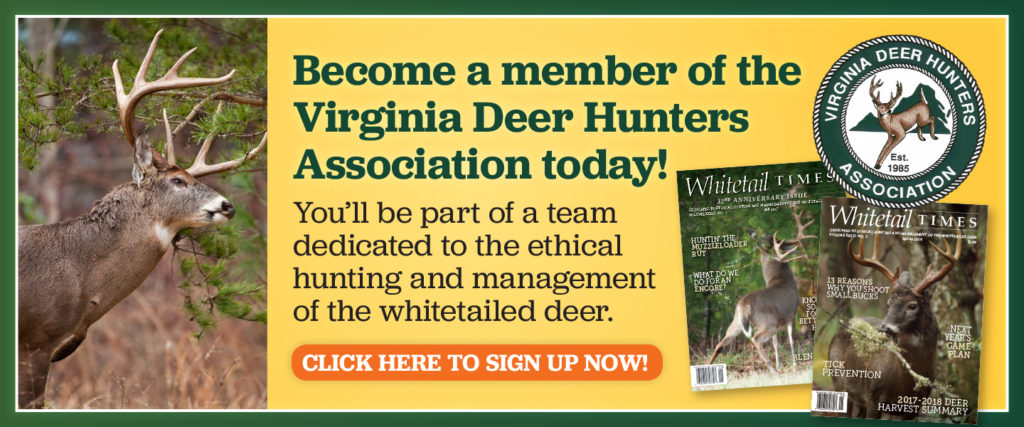Herds Without Hunters
By Matt Knox for Whitetail Times
In 1997, Dr. Larry Marchinton, my major professor at the University of Georgia, was preparing a keynote presentation entitled “Obstacles to Sound Deer Management” for the annual Southeast Deer Study Group Meeting (SDSGM) to be held in Charleston, South Carolina. As part of his preparation, he asked me to provide a list of what I considered to be some of the major obstacles to sound deer management at that time.
Included on my list was declining deer hunter numbers, about which I wrote, “this is critical… to effective management programs. Although many states show stable deer hunter numbers, I don’t think there is any question that overall deer hunter numbers are declining and are going to continue to decline.” The future decline in deer hunter numbers was a major point in his keynote address. In 1997, Virginia had just begun to experience a decline in licensed deer hunter numbers.
The next two decades regrettably confirmed my prediction. After decades in deer management, it was obvious that deer hunters were getting older and recruitment of new hunters was declining. When the SDSGM came to Roanoke, Virginia, in 2009, our meeting’s theme was “Herds Without Hunters: The Future of Deer Management?” In 2009, Virginia licensed deer hunter numbers had declined approximately 19 percent since the early 1990s.
For the 2013 SDSGM in Athens, Georgia, I finally analyzed the declining number of deer hunters in Virginia and gave a “Herds Without Hunters: The Future of Deer Management” presentation. By this time, Virginia licensed deer hunter numbers had declined approximately 26 percent since the early 1990s.
In 2013, when I projected Virginia’s declining number of licensed deer hunters trend into the future, my basic linear model estimated 188,000 deer hunters in 2023 (10 years) and 133,000 in 2038 (25 years). In fall 2021, with 185,400 licensed deer hunters, we were already below my 2023 prediction two years early.
In February 2020, I was contacted by Duane Diefenbach with Penn State University. He had been contacted and asked to write a chapter for an upcoming book, Harvest of Fish and Wildlife. He asked me if I was interested and if I had any ideas. I immediately said yes, and we agreed that we should look at the decline in hunter numbers in Pennsylvania and Virginia and forecast how the predicted declines might affect deer management in the future. The citation for this book chapter is located at the end of this article. Duane is a gifted biometrician and modeler, and I knew he would be able to take Virginia’s past and current hunter license data and build a model that would much more accurately predict the future declines than my simple 2013 linear model.

Virginia licensed deer hunter numbers, 1946 to 2021 and the predicted licensed deer hunter numbers to 2040 from Diefenbach et al. (2021). Note this does not include deer hunters exempt from purchasing a deer hunting license (e.g., landowners, etc.).
In Figure 1 (the actual black line), you will see the big game license sales data (i.e., licenses that have deer tags on them) for Virginia from 1946 through 2021. I should mention some items regarding this license data. Three details in this graph deserve comment. First, note that the number of deer hunters increased steadily through the 1950s and 1960s as the Greatest Generation came back from overseas and started families, and Virginia’s deer herd grew. Second, deer hunter numbers were stable through the 1970s and 1980s at about 300,000. Lastly, deer hunter numbers began to consistently and significantly decline during the mid to late 1990s.
From just under 300,000 licensed deer hunters in the early 1990s to approximately 185,400 in fall 2021, the Department has lost approximately 38 percent of its licensed deer hunters over the past 30 years. Converted to real numbers, this means on average we have lost about 3,800 licensed deer hunters annually over the past three decades. Only two items have temporarily stopped or reversed this declining trend over the last 30 years—economic recession(s) and Covid.
In Duane’s 2021 model, if current declines in deer hunting participation in Virginia continue, the number of Virginia licensed deer hunters, 12-90 years old, are predicted to decline by 32 percent by 2030 to approximately 118,000 licensed deer hunters and by 57 percent by 2040 to approximately 75,000 licensed deer hunters (compared to 2020; see Figure 1 (the predicted red line)).
Duane’s model also revealed inadequate hunter recruitment and hunter retention to maintain current hunter numbers across all age classes for Virginia. In Virginia, we are losing deer hunters in every single age class. In the model, recruitment of 12- to 15-year-olds in Virginia would have to more than triple to return hunter numbers to what they were in 2008.
The decline in the number of deer hunters is not unique to Virginia. Deer hunter numbers continue to decline steadily across most states within the range of white-tailed deer in the United States. Demographics of all big game hunters nationwide indicate they are older than the general U.S. population. The next five to 10 years will very likely see significant declines in deer hunter numbers in Virginia and across the nation as the baby boomers (born prior to 1964) all move into retirement.
In the Diefenbach book chapter, we surveyed 37 states and four Canadian provinces that comprise the majority of the white-tailed deer’s range in North America. In the previous 10-year period, 79 percent of the states or provinces surveyed had demonstrated a decline in hunter numbers, averaging a 9 percent decline. Only 15 percent had shown an increase and 5 percent were stable.
So what is happening to deer hunter numbers? It is an oversimplification but, in the past, deer hunting has been an activity of almost entirely white males often from or associated with a rural background. As noted in the book chapter, U.S. deer hunter demographics (> 90 percent male, 97 percent white, 55 percent rural) have changed little over the past 30 years despite more people living in urban environments and an increasing non-white population. The fact is that Virginia and the United States are becoming more culturally diverse and less rural by the day; and this trend is predicted to continue and accelerate in the future.
Rural Virginia is slowly but steadily disappearing. There has been an excellent series of recent articles describing this trend in several of the state’s larger newspapers over the last decade or so. Many or most areas of rural Virginia are already seeing and/or predicted to see continued significant declines in their human population over the next several decades. This rural exodus will have a profound effect on Virginia politically, economically, and socially, and from a deer hunting and a deer management perspective.
There is one bright area in looking at Virginia’s deer hunting demographics. There has been a significant increase in female participation rates over time. This is the reason hunting stores are selling fluorescent pink camouflage (now legal in Virginia) as well as pink guns. I expect this trend will continue and hopefully accelerate in the future.
In my opinion, the decline in deer hunters represents the biggest statewide deer management issue in Virginia. The decline in deer hunter license sales will have a significant negative effect on the Department’s ability to finance wildlife conservation programs benefiting many wildlife species. Over eight in 10 hunters in Virginia hunt deer, and hunting license sales provide more than a third of wildlife agency funding on average. This deer hunter license revenue is used to fund many other wildlife conservation programs, including nongame species, education and outreach, administration, and law enforcement.
Lastly, the continued decline in deer hunter numbers will over time have a negative effect on the Department’s ability to manage deer population levels through recreational deer hunting across much of the Commonwealth. I think that we may have already reached this point in some of the more urban/suburban areas in Virginia.
Matt Knox is the now-retired deer project leader with the Virginia Department of Wildlife Resources. He holds degrees in zoology and wildlife management from the University of Georgia. In 2016, the Southeastern Association of Fish and Wildlife Agencies named Knox the Wildlife Biologist of the Year. In 2019, Knox received the prestigious Deer Management Career Achievement Award from the Southeast Deer Study Group.
©Virginia Deer Hunters Association. For attribution information and reprint rights, contact Denny Quaiff, Executive Director, VDHA.

Legal Disclaimer:
EIN Presswire provides this news content "as is" without warranty of any kind. We do not accept any responsibility or liability for the accuracy, content, images, videos, licenses, completeness, legality, or reliability of the information contained in this article. If you have any complaints or copyright issues related to this article, kindly contact the author above.
